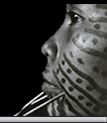Untitled Document
By
DAVID GLENN
The
current tug of war over Yanomami blood samples might be viewed as a twilight
battle in the long quarrel regarding the alleged misdeeds of the anthropologists
who studied the group 35 years ago. But it's equally true that the conflict
is a window into the future: As medical researchers and physical anthropologists
build ever-larger data banks of DNA samples, scholars can expect to see many
more battles about informed consent and donors' rights.
In
2004, 52 members of the Arizona-based Havasupai tribe sued Arizona State University
for $50-million, claiming that researchers there had misused blood samples that
were drawn in the early 1990s.
The
plaintiffs say that they had given consent only to have their blood used in
a study of diabetes. They were distressed to learn a decade later that the samples
were still in use, and that they were being deployed in research on such topics
as schizophrenia and early human lineages. (Among other things, the plaintiffs
charged that the genetic-lineage research represented "invasion of privacy
by intruding on seclusion and solitude.") Most of the claims were dismissed
by a federal judge in 2005, but claims of negligence still have to be resolved
in state court.
Similar
allegations have been raised in the Yanomami case. No firm documentary evidence
has been found that makes absolutely clear what the Yanomami were told when
they agreed to provide blood in the 1960s and 1970s, but according to the recollections
of Toto Yanomami, a village elder, and of others, they were led to believe that
the samples would be used in studies that would eventually provide relatively
direct medical benefits.
James
V. Neel, the lead researcher in those studies, was in fact interested in genetic
markers of disease, including diseases prevalent in the Amazon, so those claims
were not necessarily outrageously false. But he was also performing studies
of a very different kind. Some of his research was financed by the U.S. Atomic
Energy Commission, which was interested in developing a baseline sample of genetic-mutation
rates around the world. And no one foresaw that the samples would still be in
use 30 years later, being analyzed with genetic-research tools that were undreamed
of in 1968.
"This
is an ongoing problem that is not just unique to indigenous populations,"
says Morris W. Foster, a professor of anthropology at the University of Oklahoma
who has written several papers on the ethics of genetic research. "There
are hundreds and probably thousands of sets of samples in labs around the world"
that were drawn before modern rules of informed-consent were established, Mr.
Foster says.
Mr.
Foster adds that under current federal law, anthropologists and medical researchers
must follow the same ground rules when collecting samples. "For most studies,"
he says, "the rules include a very specific use of the samples —
either current or future use. So if you're doing a study of cancer, the consent
form says these will only be used for cancer research." Many consent forms
also specify how samples will be disposed of, Mr. Foster says.
Forging
Relationships
Jonathan
Marks, a professor of anthropology at the University of North Carolina at Charlotte
and the author of Human Biodiversity: Genes, Race, and History (Aldine de Gruyter,
1995) is not quite as confident as Mr. Foster about present-day ethical practices,
especially in cases when blood or DNA samples are drawn outside the United States.
He worries that even today, scientists sometimes choose not to fully explain
their research to the people they study. "One of the things that is pretty
clear," he says, "is that there are a lot of lies being told to people
in order to get their blood. You know, 'We're going to cure your disease.' That
has to change. Which is not to say that science has to stop. But the relationship
between scientists and the people they study has to change."
In
May the directors of the Genographic Project — a widely publicized study
of human lineage that is a joint venture of the National Geographic Society
and IBM — will meet with indigenous activists to discuss anxieties about
the study.
In
an essay in Cultural Survival Quarterly earlier this year, Debra Harry, a doctoral
candidate in anthropology at the University of Auckland, and Le'a Malia Kanehe,
a Hawaii-based indigenous-rights attorney, argued that the Genographic Project
raises concerns about "the genetic reification of cultural/ethnic groups,
group and individual informed consent, storage and security of genetic samples
and data, intellectual property issues, false notions of 'disappearing cultures,'
and prioritizing the saving of blood over the people themselves."
Some
such arguments cross the line into an unwarranted "anti-science" posture,
says A. Magdalena Hurtado, a professor of anthropology at the University of
New Mexico. Ms. Hurtado has worked for many years with the Aché, an indigenous
group in Paraguay. She says that it is perfectly possible to do ethical research
that involves blood samples, including on topics that do not involve short-term
health benefits.
"If
you go into communities," she says, "and explain to them what work
you're doing, why you're doing it, what your goals are — and then ask
individuals in the community, 'What are your objectives? How does my project
fit into your lives at the moment? How can I be part of that process and help
you?' — you can create a good working relationship. It just comes down
to using common sense and being respectful of others."
Ms.
Hurtado says that her lab has sometimes loaned Aché samples to geneticists
studying human lineage — but always after checking with the Aché
first, and on the condition that nothing will be published until the community
is informed about the findings.







